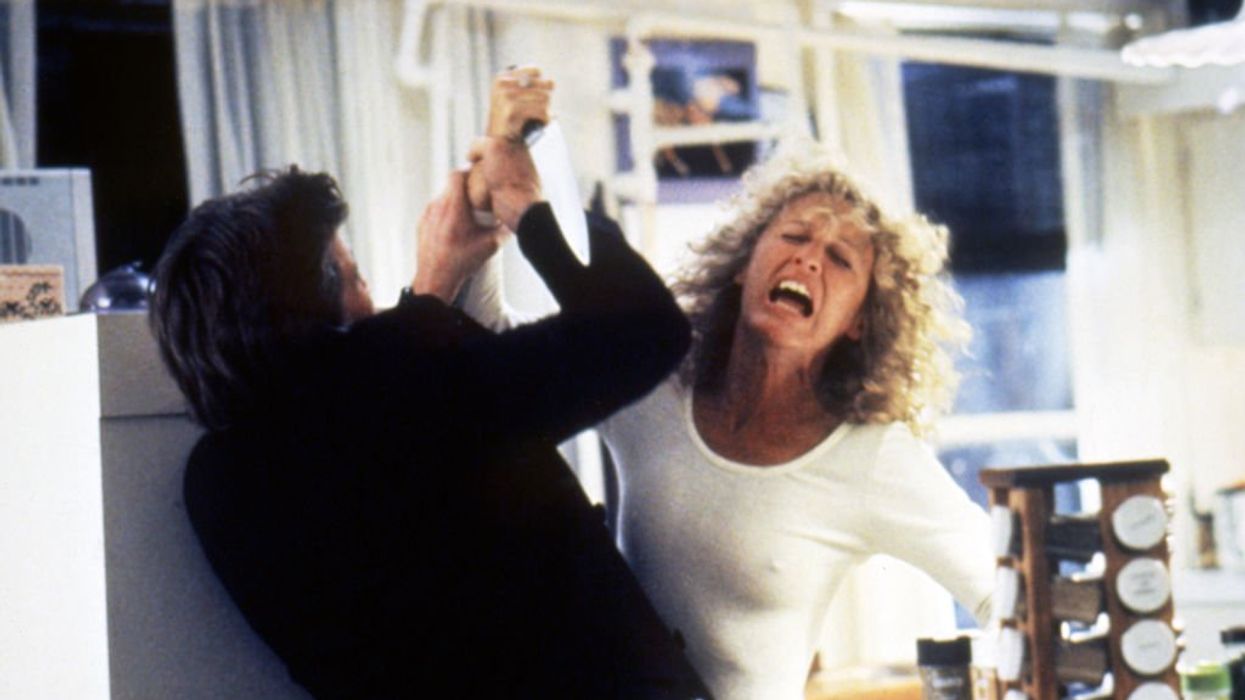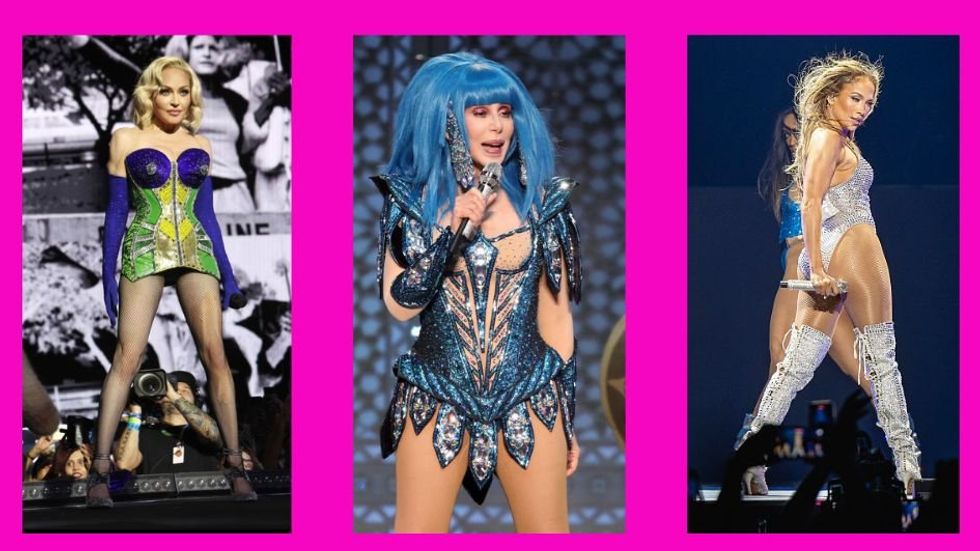
Sunset Boulevard/Getty Images

A former 'gay bestie' on why we have too many overgrown girlbosses — and far too few grande dames.
With sensitive subjects, I believe it’s best to be direct, so let’s rip the Band-Aid off: This article is about female narcissism.
It’s not about men’s faults; those are catalogued and exaggerated around the clock, every day of the year. This piece is about a truth that many people know, and have noticed, but that almost no one will dare say.
I spent decades being the 'gay best friend' in platonic female friendships. Men like me know things about women that many other men don’t.
Since the rise of feminism in the 1960s, American women have entered the workforce in unprecedented numbers, overtaken men in college matriculation (58%), and become the vast numerical majority in every industry related to childcare and instruction.
But a strange and contradictory thing has happened along the way. The more "equality" American women have gained, the more solipsistic, entitled, self-focused, and immature they've become.
We are told that women have it worse than ever and that the average man is a misogynist. Not a “sexist.” Not even a “male chauvinist pig,” as the ladies in "9 to 5" would have called such men in the days of “women’s lib.” Nay. Men are now misogynists, a word that means roiling hatred for women because they’re women.
It is a term that, until the past 15 years, was only used to describe the most depraved men, psycho-sexual serial killers such as Richard Ramirez (the “night stalker”) or Ed Gein (“the butcher of Plainfield”).
Now, it’s glibly tossed off by self-confident but dissatisfied women toward men who don’t symbolically kneel and kiss their Manolo Blahnik shoes.
Men don’t want a second date with a woman? Misogynist. Male colleagues complain about women in HR censoring their conversations and managing their tone and terminology? Misogyny. Women with part-time jobs, or women who take time off to nurture their newborns, complain hilariously about the “gender pay gap.” They claim falsely that women are paid less for the exact same work with the exact same years of service. It’s not true. Not even a little bit.
But if you point that fact out? You guessed it: misogynist.
I’m in an interesting position when it comes to commenting on the never-ending war of the sexes, a war that is being waged mainly by women against men. We men didn’t ask for these hostilities.
As a 50-year-old gay man, I spent the majority of my adult life as a leftist liberal before I matured and found grown-up conservatism. This meant I spent decades being the “gay best friend” in platonic female friendships. Men like me know things about women that many other men don’t.
When I was enacting an everyday version of Jack and Karen on "Will and Grace," I was the toast of female society. But when I began to notice the entitlement, the diva-like behavior, and the “give me stuff for free and expect nothing in return” attitude of many modern women, I was thrown to the curb.
Former friends called me — wait for it — a misogynist. And not just a misogynist but an especially virulent one. “Gay men are the most misogynistic men on the planet,” such women say in between sips of mimosas and texts to their gay BFF about what color they should ask for at the nail salon.
Some even speculated that my “anger at women” foretold a future career as a spree killer (I wish I were joking).
We’re not experiencing an epidemic of male misogyny. We’ve been living in a gynocracy for decades, and we’re saddled with a bumper crop of women who have never been told “no.” They’ve never been denied a participation trophy or a promotion to HR manager. They’ve never been told they’re not a “10.” They’re not even expected to say “thank you” when a gentleman holds a door for a lady.
Some readers think I exaggerate. They’re constructing an image of me as a “bitter” or “frustrated” man. This is where the modern female mind (and the minds of too many feckless, gelded men) go when women are held to the same standards of deportment and adult behavior that men are expected to maintain.
It’s a fish-who-doesn’t-know-what-water-is problem. Since the flower power era, feminism has been the oxygen that all Americans, liberal and conservative, breathe. We think outsized female self-regard and entitlement is normal, but it’s not. It’s recent, and it’s at the root of huge societal problems, “wokeness” being the biggest.
Let me give you an example from the real world. This will indeed seem like “no big deal” to many readers, and it’s true that it’s a mild incident. But consider whether you would react that way if the sexes were reversed.
I went to the city dump to unload a car full of branches and lawn trimmings. As I hauled the leaves over to the pile, two late-middle-aged women in twin-set sweaters and pearls were doing the same about five feet from me.
One said to the other, knowing full well that I was standing there, “Where are the men? Why should we have to do this? Do they do anything?” They both gave a soft, suburban chuckle. Her friend responded, “At least when women are around we know work will get done.”
Were I to respond to those women the way they would have responded to me in the reverse, I would have shrieked, “Misandrist!” and run home to tell my wife how unsafe I felt at the town grass tip. The point is, it would not even occur to most men to be so gauche about women in mixed company. Not only are most men not inclined to give women social offense that way, they know damned well they’d be punished if they did.
RELATED: How leftists think — and how you can change their minds

This brings me to, of all people, Taylor Swift. The biggest pop star in the world became a household name by singing forgettable songs about inadequate men and the trauma of a teenager’s dating life. Thing is, she’s still singing about this stuff at age 35. And her concerts are packed not just with teen girls, but with suburban moms well into their 50s, crying the way adolescent girls did in the early '60s when the Beatles first washed ashore.
This is not normal. This infantilized girlboss pose by mothers and career women has no historical precedent. For all the talk of shiftless, video-gaming boys and young men, we spill precious little ink on the fact that adult women think nothing of dressing like 16-year-old tarts and waxing about how they’re in their “soft girl era.”
It’s undignified and so is the direction Miss Swift is taking with the publicity for her new album. Take a look at the photo she released on social media.
It’s too generous to call that garment a teddy; it’s closer to a gownless evening strap (pacé Shirley Bassey). Her rump is exposed, and she’s bending over to stick out her backside while leaning against what looks like a truck stop bathroom wall. Even the lighting looks like grimy gay male pornography from the 1970s.
What does this have to do with the state of ordinary, everyday, non-Taylor Swift women? A lot.
Miss Swift is doing on stage what millions of workaday women are doing on the street. She is refusing to age gracefully, and she’s getting raunchier as time goes on. This has been a pattern with women for the past 15 years, as mothers don’t want to be seen as mothers but as the older, more ... experienced version of their nubile daughters.
This is the friction point where we can see that modern female narcissism is an expression of extreme insecurity in women. These ladies have a terribly sad belief that the only thing of value they have to offer is sex. And no, it’s not the "male gaze” or “male producers” who are at fault. Taylor Swift — and Linda Smith down the street — are doing this to themselves.
Women call it the “invisibility” problem. On leaving youth and entering middle age, they say, men stop looking at them as desirable. This is a double-edged sword for most women. Many express relief at not having their breasts and backside ogled (men are cads; women aren’t making that up), but at the same time, they complain bitterly about no longer being perceived as sex objects.
They blame this on “patriarchal” male tastes, but that’s just feminist cope. If fault there be, it is the fault of nature, not social constructs. Women lose their sexual appeal after youth in a way that men, largely, do not. This is a fact. No, it's not a fun or favorite fact. But it is a fact.
Women seem to believe they are entitled to be lusted after and desired at 45, 55, 65, the way a fresh-faced college girl turns men’s heads. It’s ridiculous. Look at Madonna (67), Cher (79), or Jennifer Lopez (56). That’s the road Taylor Swift is on, and mind-bogglingly, it’s the road way too many normal women seem determined to travel.

The problem these women are facing, I believe, stems from the fact that so many have stayed adolescent girls their whole lives instead of learning from the example of their grandmothers. There is an arc to a woman's life. Some have called it Maiden, Mother, Crone. If you don't like that, label it some way you find pleasing.
There is a role for middle-aged and old women, at least there always used to be. It was upheld in almost all societies before the mid-20th century. Even the actresses of old Hollywood, beauty queens in youth like Joan Crawford, assumed this role as they aged. Our grandmothers assumed this role.
It is the role of the grande dame. It is the carriage of a mature, put-together, self-confident, and wise woman. A true matriarch. Hair goes up, and hems go down.
Youthful beauty and sex appeal are natural to the young part of a woman’s life; this tracks with evolutionarily programmed facts of reproduction. When one is past one’s reproductive prime, life offers new roles to men and women.
But not in the 2020s. But it doesn’t have to be this way for women. Dignity is available to those who will step into it.
Josh Slocum